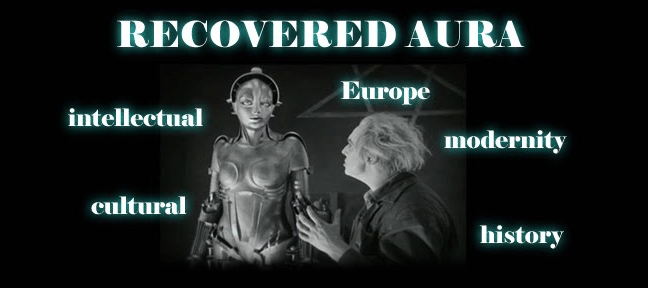Study Questions: Nietzsche, Genealogy of Morals and Thus Spoke Zarathustra (excerpt); G. Le Bon, The Mind of Crowds (excerpt)
The greatest conspiracy theory ever told, and other highlights from the greatest thinker of the late-nineteenth-century revolt against the modern (bourgeois) world -- plus a quick look at a more practical application of end-of-century elitism.
1. What is Nietzsche's project here? What does it meant to construct a "genealogy" of moral systems?
2. What is the evidence N. uses in Essay 1 to trace the genealogy of ideas of good and bad? Is this convincing? Why or why not?
3. Sections 6-8 offer the core of N.'s historical argument, explaining the position in world history of Judaism. In what sense did Judaism (and then Christianity) represent “the slave revolt in morality”?
4. What is the culture of "ressentiment" (which means resentment, more or less)? Does this make psychological sense to you? Is Nietzsche making a racial (racist?) argument here?
5. In section 11 and 12, Nietzsche vents his disgust with the “man” of his age – “maggot man…the hopelessly mediocre and insipid man” (43). Who does he seem to be talking about? Have any of our other authors had similar concerns? (Hint: notice that Nietzsche is concerned that European man is becoming “more Chinese” (44) – what’s he talking about?)
6. If “the meaning of all culture is the reduction of the beast of prey ‘man’ to a tame and civilized animal” (42) then what does that seem to say about culture over all? Why (and to whom) would this have been shocking then? Is it still shocking now?
7. In the second essay, Nietzsche turns to the development of conscience and guilt. What is the process by which humans were made into the "animal with the right to make promises"? Or, to put this another way: What does it mean to claim that “blood and cruelty lie at the bottom of all ‘good things’!” (62)
8. Second Essay, section 12 is a fascinating discussion of N.'s historical method; be ready to put this argument into your own words. How might this technique be applied to questions other than that of punishment? [History majors and History MA students are especially encouraged to read this section carefully!]
9. Second Essay, section 16 provides the core of Nietzsche’s argument, but his explanation of the origins of conscience becomes a theory of civilization itself. Again, what is the overall vision of “civilization” here? Does this argument affirm man's animal nature? If so, does Darwin (whom N. mentioned in the preface), seem important here?
10. The final sections of Essay 2 tie up loose ends, specifying the argument with regard to history, violence, art, and religion. The burning question is: if this diagnosis is correct, what should we do about it? What happens next? Does N. answer that question? Does he provide any (ever so cryptic) hints?
11. Turning to our reading from Thus Spoke Zarathustra (in the reader): How does the metaphor of “the three metamorphoses” encapsulate the basic message of the Genealogy of Morals?
12. Does the search for new values happen alone or in society? Why? But aren't values necessarily "social"? What does it mean if they're not?
13. Why do you think Nietzsche wrote this way? What is the effect of this strange, metaphorical, personalized manner of presenting his arguments?
14. Finally: what is Le Bon’s main goal in “The Mind of Crowds”? What is his core argument? How do his concerns here seem similar or different from those of Burke, Mill, or Nietzsche?
15. In an age of expanding democracy, what kind of political attitudes are reflected by Le Bon’s description of the crowd?
...........
And now, questions from the good people in Group 4. (As always feel free to have your written response answer one of these, or one of mine, as you prefer.)
1) Le Bon concludes that while crowds are intellectually inferior to
the individual, crowds are capable of heroic feats that would be
unattainable by an individual. What does this suggest?
2) What does Le Bon’s theory of crowds suggest about the permanency of
nations?
3) How is Le Bon’s theory of crowds similar to Nietzsche’s view of
noble behavior (pgs. 40-41)?
4) In Thus Spoke Zarathustra, Nietzsche designates three stages of the
spirit. Does Nietzsche consider the metamorphoses inevitable or
something else?
5) On pages 27-28, Nietzsche addresses the "etymological significance" of "good" and "bad." What linguistic implications do these words have? Why are these implications significant?
6) Nietzsche has strong opinions about the morality of the Jews. Why does Nietzsche label Jews as "priestly people" on page 33? How do Nietsche's feelings toward the Jewish population tie in with Wagner?
7) What does Nietzsche mean when he says a sovereign man "has the right to make promises?" (p. 59) What other qualities does a free man possess?
8) Why does Nietzsche refer to the "bad conscience" as an "illness?" What are the symptoms of this illness?
9) What kind of biblical allusions does Nietzsche make in Thus Spoke Zarathustra ? What is their significance?
10) What is "ressentiment" according to Nietsche? How does this concept differ from master morality?
Sunday, March 7, 2010
Subscribe to:
Post Comments (Atom)

No comments:
Post a Comment